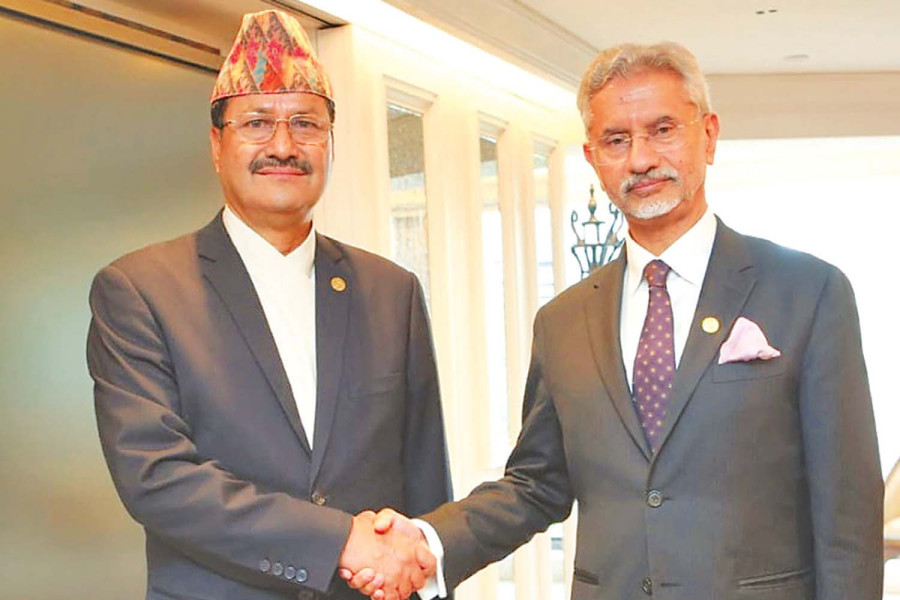National
Nepal-India joint commission to meet next month, after a gap of three years
S Jaishankar will visit Kathmandu for the most important bilateral mechanism’s meeting between two countries.
Anil Giri
India’s External Affairs Minister S Jaishankar is visiting Kathmandu in the first week of January for the seventh meeting of the Nepal-India joint commission.
Jaishankar, who is arriving at the invitation of Foreign Minister NP Saud, will take part in the highest bilateral mechanism between the two countries to review and smoothen Nepal-India relations.
After both sides tentatively agreed to meet in the first week of January, the Ministry of Foreign Affairs has started the groundwork for the visit by preparing the agenda. Some memorandums of understanding will likely be signed during the visit as both sides prepare for the meeting taking place after a hiatus of nearly three years.
According to Foreign Minister Saud, discussions are underway between various ministries to finalise the meeting’s agenda.
Tentatively, the two sides have agreed to convene on January 4. Jaishankar will arrive in Kathmandu that morning and return the next day after meeting party leaders, including the prime minister and other officials, an official at the foreign ministry said.
Jaishankar’s visit was postponed several times in the past due to busy schedules on both sides. This was Nepal’s turn to host the meeting that will review progress in various India-funded projects in Nepal, work to strengthen relations between the two countries’ leaderships, and open new avenues of relationship.
The Joint Commission reviews all aspects of bilateral ties and is empowered to make necessary decisions.
The meeting will take stock of the agreements and understandings reached between Nepal and India during the recent India visit of Prime Minister Pushpa Kamal Dahal, said the foreign ministry official.
Prime Minister Dahal went on an official visit to India from May 31 to June 2. Officials said that besides looking into the constraints that India-funded projects are facing in Nepal and charting the way forward, some agreements are expected to be signed during Jaishankar’s visit.
Dahal, during an interaction with editors and journalists on Monday, said that Nepal and India will sign an agreement to export 10,000MW electricity to India within 10 years, as agreed during his India visit.
The deal was expected to be signed much earlier but the Indian cabinet’s delay in endorsing the plan has pushed it back.
Jointly addressing the media with Indian Prime Minister Narendra Modi in New Delhi on June 1, Prime Minister Dahal announced that both sides had agreed on a long-term power trade plan for India to import 10,000 megawatts of energy from Nepal within 10 years.
Six months since the visit, there could not be a more appropriate time to seal the deal and boost confidence in bilateral trade, an official at the energy ministry said.
The last meeting of the joint commission took place in New Delhi on January 15, 2021 in the wake of the boundary dispute between Kathmandu and New Delhi after the then KP Sharma Oli government unveiled a new political map of Nepal incorporating the territories of Kalapani, Lipu Lekh and Limpiyadhura, which are currently occupied by India.
In their last meeting, the two sides reviewed the entire spectrum of bilateral relations including the supply of Covid-19 vaccine, boundary and border management, connectivity and economic cooperation, trade and transit, power and water resources, as well as culture and education.
The last Delhi meeting, shadowed by the pandemic, among other things discussed the challenges posed by Covid, and India’s assistance of essential medicines and medical equipment to Nepal.
“The meeting discussed the boundary matter and expressed the commitment to an early completion of the boundary works in the remaining segments,” said the statement issued after the meeting. It also took up the agenda of reviewing the 1950 Peace and Friendship Treaty, submission of the report of the Eminent Persons Group, and air entry routes.
According to Nepali officials, the upcoming meeting will follow up on the understandings reached during the official visit of Prime Minister Dahal. It will also discuss cross-border infrastructure and connectivity, development partnership and expeditious implementation of major ongoing projects and initiatives, establishment of an earth station in Nepal with India’s assistance, construction of integrated check posts, railway links, power transmission lines and upgrade of roads and bridges.
The meeting is also expected to finalise more agreements including the signing of Nepal-India digital payment system, possible breakthrough in Pancheshwar multipurpose project, short-term energy export of up to 200 MW to India, according to a New Delhi-based Nepali diplomat.
Besides, India’s proposal to hike the budget for each small development project in Nepal from the present Rs50 million to Rs240 million will be on the table. The Nepal Cabinet is currently discussing the proposal. The finance ministry has trimmed down the Indian offer and agreed to accept Rs200 million for each development project citing that the country wants more aid to medium development and infrastructure projects instead.
The meeting will also discuss ways to speed up implementation of cross-border railways, roads and transmission lines. The issue of inundation faced by the people living in border areas due to east-west embankments lacking adequate drainage is up for discussion too.
The joint commission was instituted during the Nepal visit of Indian prime minister Chandra Shekhar in February 1991.
The foreign ministry is talking to other ministries concerned as part of the preparations for the meeting, Saud told the Post.




 8.54°C Kathmandu
8.54°C Kathmandu















